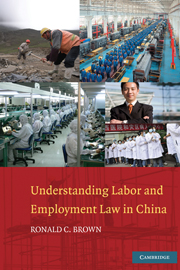Book contents
- Frontmatter
- Contents
- Preface
- Acknowledgments
- Understanding Labor and Employment Law in China
- PART I UNDERSTANDING CHINA'S REGULATION OF THE WORKPLACE
- PART II EMPLOYMENT RELATIONSHIPS
- PART III HIRING AND EMPLOYMENT PRACTICES
- PART IV WORKING CONDITIONS, WAGES, AND HOURS
- PART V EMPLOYEE BENEFITS: LEAVES, MEDICAL, MATERNITY, WORK-RELATED, UNEMPLOYMENT, AND PENSION INSURANCE
- PART VI DISCIPLINE AND TERMINATION UNDER EMPLOYMENT AGREEMENTS
- 12 Employer Work Rules, Discipline, and Termination
- 13 Restrictive Covenants: Employee Loyalty and the Employer's Protectable Interests
- 14 Resolving Labor Disputes by Mediation, Arbitration, and Litigation
- PART VII RIGHTS, REMEDIES, AND MULTIPLE FORUMS
- Appendix
- Index
- References
14 - Resolving Labor Disputes by Mediation, Arbitration, and Litigation
Published online by Cambridge University Press: 22 January 2010
- Frontmatter
- Contents
- Preface
- Acknowledgments
- Understanding Labor and Employment Law in China
- PART I UNDERSTANDING CHINA'S REGULATION OF THE WORKPLACE
- PART II EMPLOYMENT RELATIONSHIPS
- PART III HIRING AND EMPLOYMENT PRACTICES
- PART IV WORKING CONDITIONS, WAGES, AND HOURS
- PART V EMPLOYEE BENEFITS: LEAVES, MEDICAL, MATERNITY, WORK-RELATED, UNEMPLOYMENT, AND PENSION INSURANCE
- PART VI DISCIPLINE AND TERMINATION UNDER EMPLOYMENT AGREEMENTS
- 12 Employer Work Rules, Discipline, and Termination
- 13 Restrictive Covenants: Employee Loyalty and the Employer's Protectable Interests
- 14 Resolving Labor Disputes by Mediation, Arbitration, and Litigation
- PART VII RIGHTS, REMEDIES, AND MULTIPLE FORUMS
- Appendix
- Index
- References
Summary
Legal Regulation of Labor Disputes
Labor disputes arising from statutory or contractual bases are resolved by the governmental labor mediation and arbitration process. The mediation process traditionally occurs within the enterprise and is voluntary. Arbitration is available, but claims must be filed within time limits. The Labor Mediation and Arbitration Law (LMA) became effective on May 1, 2008. It provides increased accessibility for employees and greater finality to the arbitration process. It also clarifies the relationship of arbitration awards to judicial appeal. Certain exceptions to the usual exhaustion requirement are now included where direct access to the court is permitted. The new law seems to have spurred an increased use of arbitration: “Guangdong's courts and arbitrators handled more than twice as many labor disputes this May than a year earlier, after introduction of rules giving workers more rights and making arbitration free.”
The evolving legal regulation of labor arbitration, resulting in the current, primary regulations, began in 1993 with Regulations on Settlement of Labor Disputes in Enterprises, which were followed by the 1994 Labor Law and two Supreme People's Court Judicial Interpretations in 2001 and 2006. The LMA and the Labor Contract Law (LCL) were passed in 2007 and became effective in 2008. On January 1, 2009, new Labor and Personnel Dispute Arbitration Procedure Rules were issued by the MOHRSS. Altogether, the laws make available a three-step process of mediation, arbitration, and litigation.
- Type
- Chapter
- Information
- Understanding Labor and Employment Law in China , pp. 168 - 184Publisher: Cambridge University PressPrint publication year: 2009
References
- 1
- Cited by



